Portuguese Water Dog Breed Information
The Portuguese Water Dog has a storied past tied to the sea and is known for its smartness, agility, and strength. These traits made it an excellent helper for fishermen in Portugal. Today, these dogs are loved for their ability to fit in with family life. They love being in the water and are still known for their strong work ethic.
Their hypoallergenic fur and unique webbed paws were perfect for their original job. Now, these features make them stand out to dog lovers. Learning about their care and behaviors is vital as more people welcome these dogs into their homes. Looking into the Portuguese Water Dog’s needs can reveal more about this fascinating breed.
Key Takeaways
- Portuguese Water Dogs excel in agility and intelligence.
- They possess water-friendly features, like webbed feet.
- Understanding their care ensures a healthy pet relationship.
Portuguese Water Dogs were once indispensable to Portuguese fishermen. These dogs now integrate seamlessly into family environments. Webbed feet and non-shedding coats make them popular among dog enthusiasts.
Quick Facts
The Portuguese Water Dog is more than just a pet; it has a rich heritage as a fisherman’s aide and is the 46th most popular dog breed out of the 200 recognized by the American Kennel Club.
Originating from Portugal’s Algarve region, this dog excelled in tasks such as guiding fish into nets, retrieving lost tackles, and passing messages from boat to boat.
Male dogs of this breed stand 20-23 inches tall and weigh 42-60 pounds. Female Portuguese Water Dogs are a bit smaller, with a height of 17-21 inches and a weight range of 35-50 pounds.
This breed’s coat is notable for being hypoallergenic, as it doesn’t shed like other dogs. They come in colors such as black, brown, and combinations of black and white or brown and white.
With a lifespan of 11-13 years, the Portuguese Water Dog is a member of the Working Group of Dogs, reflecting their history of assisting with fishing tasks.
Their robust build and energetic nature make them well-suited for active families and those with an affinity for the water.
Portuguese Water Dog Breed Pictures
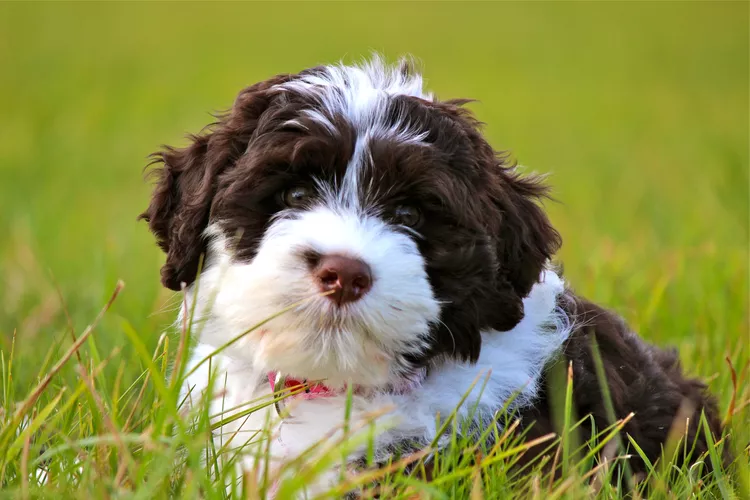
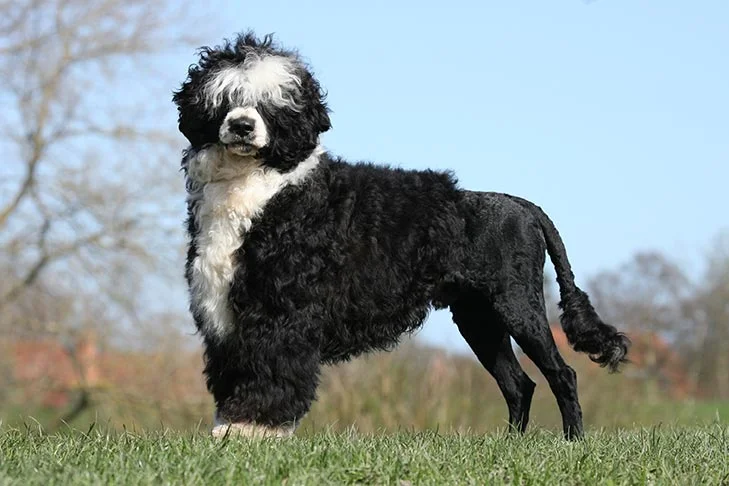
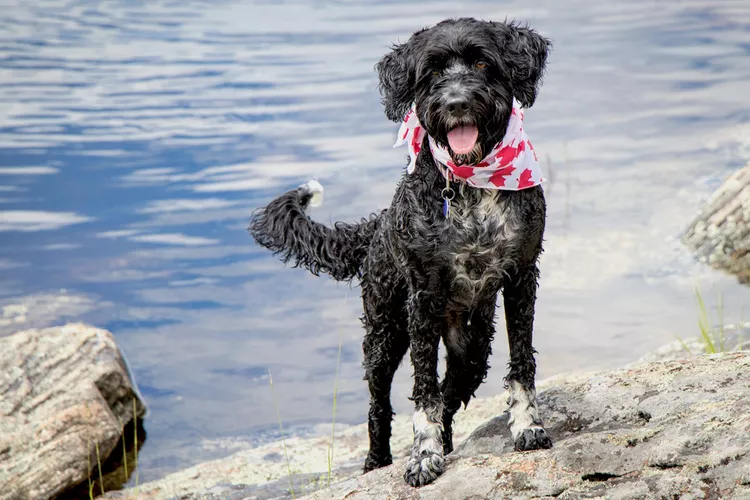
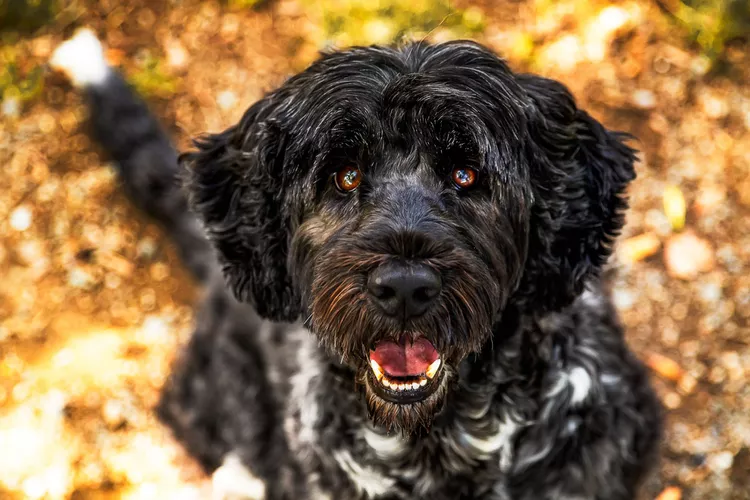
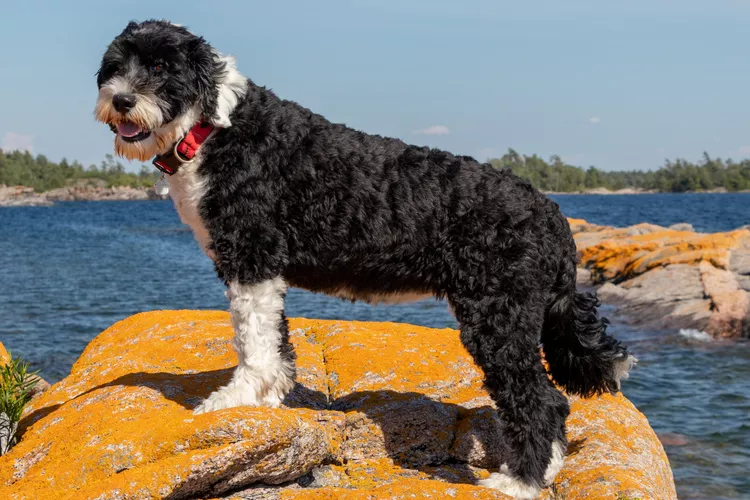

Overview
The Portuguese Water Dog is a versatile and athletic breed, well-known for its roles in various activities and suitable for different family environments. These dogs are part of the Working Group and have a sturdy build; male dogs typically stand between 20 and 23 inches tall, while female dogs are around 17 and 21 inches. With a life expectancy of 11-13 years, they are a long-term commitment for owners.
Their intelligence and independence mean they excel when given tasks that challenge them physically and mentally.
Their coat is hypoallergenic and comes in single-layered black, brown, or patterned varieties, requiring regular grooming.
The Portuguese Water Dog needs enough room to move and proper socialization to ensure they get along well with children and other pets.
Key Traits
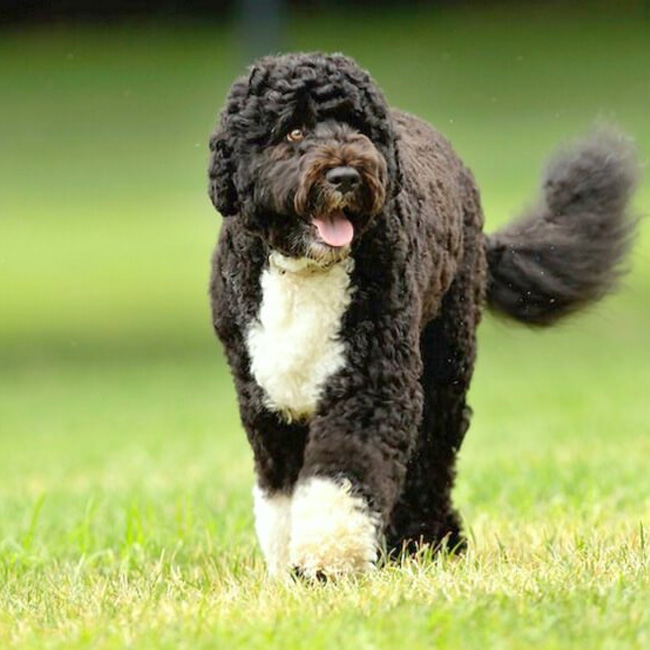
Portuguese Water Dogs are celebrated for their sharp minds and ease of training, making them perfect for obedience and agility. These canines are quick learners, ready to respond to commands and thrive on new challenges. This makes them stand out in activities that require structure and complex instructions. They’re naturally active and need to stay both physically and mentally engaged. This makes them an excellent match for people who lead dynamic lives.
| Trait | Description | Relevance |
|---|---|---|
| Intelligence | Learns quickly and follows commands effectively | It fits well with energetic owners |
| Activity Level | Full of energy and ready for action | It works well with active owners |
| Affectionate Nature | Warm and outgoing with people | Well-suited for emotional support and companionship |
Their intelligence, love for activity, and friendly temperament make them excellent for various roles. Their unique coats are also low-shedding, which benefits people with allergies. Portuguese Water Dogs are wonderful pets that adapt to many work and family environments.
Pet Parents: Maritime Heritage
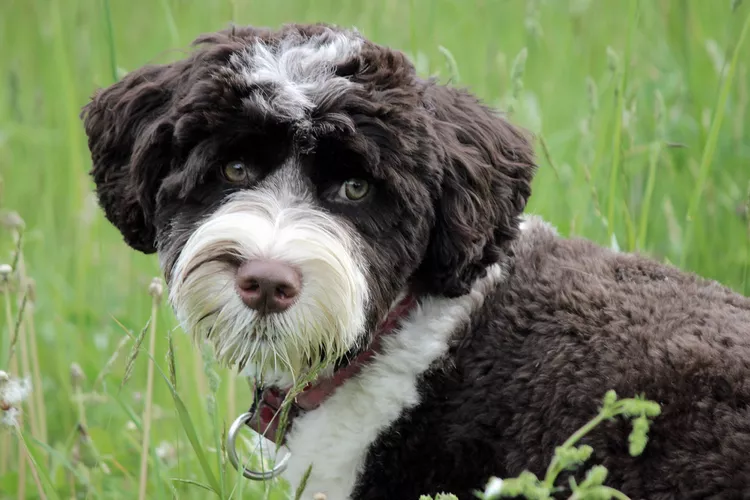
The Portuguese Water Dog is strongly connected to the sea due to its work on Portugal’s coastline. These dogs were valued for their significant support in fishing, taking on roles like guiding fish toward nets and recovering misplaced equipment. They also played a role in naval missions, proving the breed’s importance in sea-related tasks and traditions.
These dogs originated from the Iberian Peninsula, working closely with fishermen. The Portuguese Water Dog was crucial as a helper in the fishing trade, showing off its smarts and ability to learn. Historical accounts show the breed’s involvement in military sea operations, demonstrating its adaptability and stamina.
The history of the Portuguese Water Dog celebrates the deep bond between dogs and human maritime efforts.
Nautical Origins
The Portuguese Water Dog has a strong connection to its sea-faring past. These dogs were trained to be relentless helpers for fishermen, skilled in various tasks such as guiding fish into nets and retrieving lost equipment from the ocean. They were often referred to as the Portuguese Fishing Dog due to their specialized ability to operate in water settings, which proved essential for fishing villages. They were called ‘cão de água,’ or the Algarvian Water Dog, in homage to their maritime roots.
The breed’s unique single-coated fur that doesn’t shed was selectively bred to withstand the harsh oceanic weather, allowing it to work effectively without being weighed down by wet fur. Their significant role aboard fishing vessels, sometimes traveling as distant as Iceland, cements their status in nautical history.
Fishing Assistant Role
Two Portuguese Water Dogs have long been valued for their assistance in fishing. These sturdy dogs were essential for retrieving nets and saving fishermen time and effort.
Their natural affinity for water and muscular build made them great at swimming to fetch damaged nets. They could also herd fish into nets, using their instincts and agility.
These skilled dogs worked closely with fishermen, creating a partnership that helped improve fishing productivity. Their work in the water was efficient and reliable, showcasing their importance in maritime history.
Naval Duties History
Portuguese Water Dogs have played a crucial role in naval history. They have excelled in tasks such as guiding fish into nets, retrieving items from the water, and delivering messages from ship to shore. These dogs were bred specifically for their exceptional swimming skills and were often seen on fishing boats, assisting Portuguese fishermen from their native coasts to the icy Atlantic near Iceland.
Portuguese Water Dogs are known as ‘cão de água’ or the Algarvian Water Dog in their homeland. This name reflects their long-standing relationship with the sea. Their distinctive coat is single-layered, doesn’t shed, and comes in various colors. However, regular grooming is required to keep them in top shape for water activities.
The dedication of individuals like Vasco Bensaude, António Cabral, and Deyanne Miller has been instrumental in preserving the breed and boosting its popularity. These individuals worked tirelessly to ensure these skilled dogs didn’t fade into obscurity. They recognized the importance of Portuguese Water Dogs in maritime traditions.
Physical Dimensions
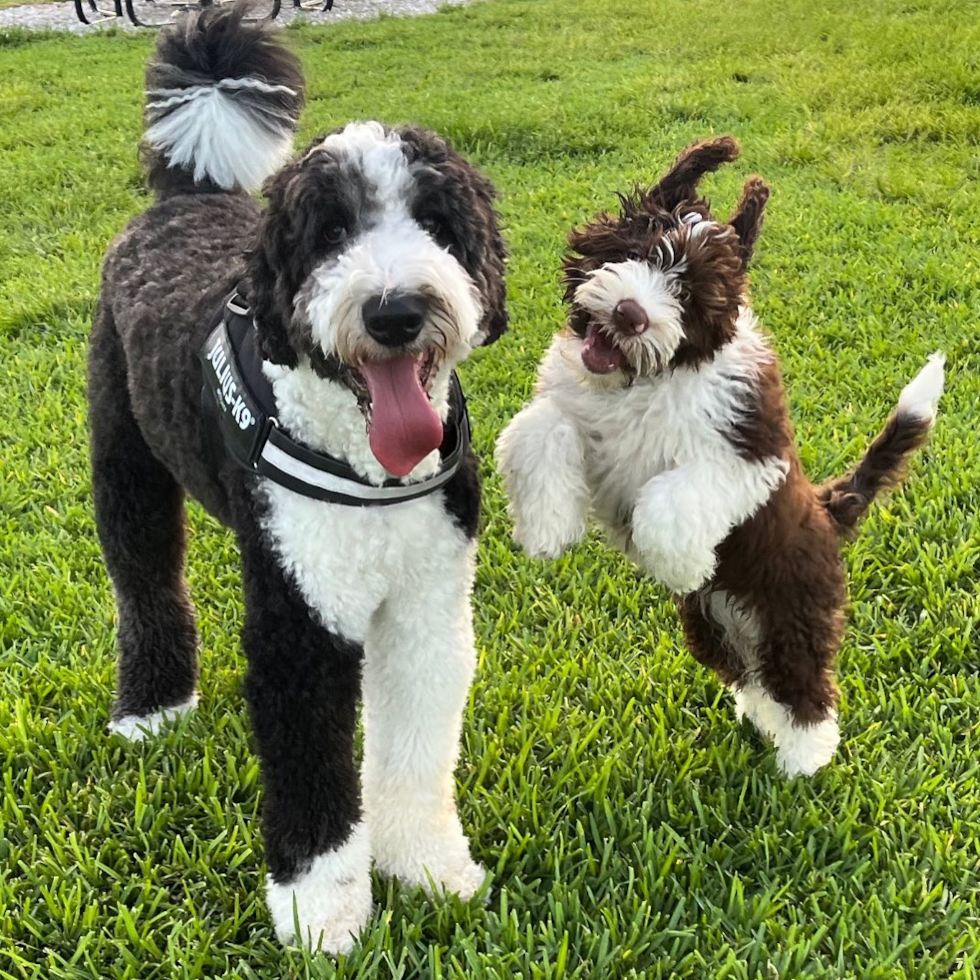
The Portuguese Water Dog is known for its sturdy build, which is crucial when considering how to care for them and what they can do. This dog breed has specific size standards indicate a muscular frame suited for water-based work. Knowing their average lifespan and growth stages helps owners and breeders ensure the dogs’ well-being.
- Breed Size Guidelines
- Weight and Height Parameters
- Body Shape Features
- Average Lifespan
The Portuguese Water Dog possesses a solid and athletic build, necessary for the rigorous activities they were bred to perform in the water. Knowing their expected weight and height is helpful, as this impacts their health and exercise needs. Understanding their typical life expectancy and developmental milestones guides proper care and training.
Breed Size Standards
Portuguese Water Dogs are known for their medium size and robust physique, making them perfect companions for those who love the water and active lifestyles. Female Portuguese Water Dogs have a height range of 17 to 23 inches and generally weigh between 35 and 50 pounds. Males are slightly larger, standing 20 to 23 inches tall and weighing between 42 and 60 pounds. These measurements are crucial because they ensure that dogs can perform their traditional tasks effectively.
The American Kennel Club sets these breed standards for appearance and the dogs’ health. Sticking to these size requirements helps prevent health issues like hip dysplasia. This condition can worsen if the dogs are over or under the ideal size. Breeders and dog lovers should focus on meeting these standards for the dogs to remain healthy and active.
Keeping the puppy within these limits ensures they can continue to excel in activities they’re built for, such as swimming.
Weight and Height Range
Knowing the size range of Portuguese Water Dogs is critical when considering them for activities and their overall health. Female Portuguese Water Dogs usually stand about 17 to 23 inches tall and weigh 35 to 50 pounds. Male dogs of this breed are a bit bigger, with a height of 20 to 23 inches and a weight of 42 to 60 pounds. Their medium build and energetic disposition make them an excellent fit for active households.
Portuguese water dogs are known for their strength and smartness, placing them in the Working Group of dogs. These dogs need consistent grooming and exercise to keep them healthy and looking their best. Owners should have enough room and environment to keep up with these lively dogs.
Body Shape Characteristics
The Portuguese Water Dog is a sturdy and well-proportioned canine, reflecting its past as an all-around working dog. Males stand about 20-23 inches tall at the shoulder and typically weigh 42-60 pounds. Females are usually smaller, measuring 17-21 inches in height and weighing 35-50 pounds.
These dogs were bred for water jobs and had a muscular frame for swimming and other water-related tasks.
Their coat is either wavy or curly and not only looks unique but helps the dog perform better in the water. This coat provides insulation and helps with floating, making it easier for the dog to move through the water. Regular grooming is a must to keep their coats in good shape. This includes brushing and cutting to control the growth and keep their distinctive look intact.
The color and pattern of their coat add to the breed’s eye-catching presence.
Typical Lifespan
Portuguese Water Dogs are known for their sturdy build and can live for 10 to 14 years. Originating from a working background in the maritime trades of the early 1900s, these dogs are medium-sized and athletic.
Male Portuguese Water Dogs typically have a height of 20 to 23 inches at the shoulder and weigh between 42 to 60 pounds. Females are smaller, usually standing 17 to 21 inches tall and weighing 35 to 50 pounds.
Their thick, waterproof coats are great for those with allergies but need consistent grooming to keep the dogs in good shape. Owners should be attentive to their health, especially concerning conditions like dilated cardiomyopathy, to ensure their pets live whole, healthy lives.
Growth Development Stages
Portuguese Water Dogs experience noticeable physical changes during their growth. These dogs usually reach their full size by two years of age. In the first year, they increase, hitting about half their adult size by six months. Growth slows a bit after seven months, but they keep developing until males stand 20-23 inches tall and females 17-21 inches.
Males typically weigh 42-60 pounds, and females range from 35-50 pounds. Proper care, including good nutrition, regular exercise, and routine vet check-ups, is critical for their healthy growth. This ensures they smoothly transition through each growth phase, reaching fit adult sizes.
Behavioral Characteristics
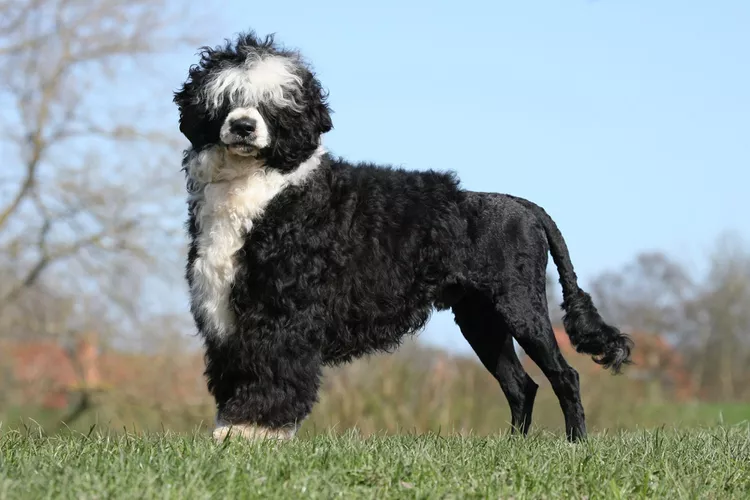
The behavioral characteristics of the Portuguese Water Dog include a wide range of qualities due to their past as hardworking dogs. They need engaging training to use their smarts positively and interact with people and other pets from a young age. Keeping their hunting instincts in check and ensuring they get enough physical activity is vital to their happiness and preventing bad habits from forming.
- Their temperament can be very eager to please or a bit more self-reliant.
- Because of their history, their training and smarts require regular, exciting tasks to stay focused.
- Mixing with people and pets is crucial for their friendly nature and to prevent them from being too protective.
- Their need for exercise and fun is high, and they especially love anything to do with water, which shows their heritage.
These dogs were once vital helpers for fishermen, so they love the water and need jobs. Giving them a variety of activities and playtime with others will help them be their best.
Temperament Traits
Portuguese Water Dogs are known for their loving and energetic personalities. They have a mix of independence and smarts, making them easy to train for obedience and agility. As a breed from herding stock, they have a natural inclination to work, which serves them well in dog sports and as service or therapy dog. They’re friendly with new people, which helps them in roles that require interaction.
These dogs also have unique communication methods, such as a distinctive bark and expressive panting. They can be trained to use these signals for helpful tasks, such as alerting someone with hearing impairment to a ringing phone. Their vocal sounds, including whining, show they’re eager to connect with their owners and are loyal companions.
Training and Intelligence
Portuguese Water Dogs are known for their friendly and easygoing temperament. They are also brilliant, making them great candidates for various training programs. Their smarts are not just for show; they come from a history of aiding fishermen, where quick thinking and flexibility were crucial.
These dogs are quick learners with a knack for following commands and performing specialized tasks. For instance, they can be trained to notify their owners of noises such as a ringing phone.
Due to their smarts, Portuguese Water Dogs do best with consistent and stimulating training sessions. They also need much space and exercise to burn off their abundant energy. When it comes to other pets, they’re usually good company, but it’s wise to be careful around smaller animals.
Socializing With Others
Portuguese Water Dogs are naturally friendly and get along well with people and other pets. This is especially true when they’re socialized early with positive experiences. Consistent training using rewards is crucial to their good behavior. They must meet different people and animals and see various places to become good social companions. Dog owners are responsible for providing these chances, which build the dog’s confidence.
Taking them to playdates, dog parks, and training classes helps them become adaptable and social.
These dogs are happiest when they have a routine and know what’s expected of them. Their friendly nature makes them great family pets, but they must learn to behave around others. Introducing them to new situations and faces is the best way to teach them. It’s up to the dog owners to make sure their dogs get these learning opportunities.
Activities like playdates, trips to the park, and training classes are great ways to do this. They help the dogs learn how to behave and get along with others.
Prey Drive Management
Understanding and managing the prey drive in Portuguese Water Dogs is crucial for peaceful living with other pets and people. These dogs have a history of helping fishermen, so they have a strong instinct to chase.
Training them consistently and giving them activities that use their instincts well is essential. Games like fetch or agility training can help turn their prey drive into positive actions.
Teaching them to control their impulses is crucial to stopping them from chasing or nipping.
Introducing them to other animals early on is beneficial to prevent aggressive behaviors.
Exercise and Activity Needs
Portuguese Water Dogs thrive on plenty of daily exercise due to their heritage as working dogs alongside fishermen. They are full of energy and need a lot of physical activity to stay healthy, both mind and body.
These intelligent dogs benefit from mentally stimulating exercises to prevent them from becoming bored and potentially destructive. A large, secure yard is essential for them to expend energy and reduce their urge to wander. Since they love water, swimming is an excellent way for them to get exercise.
It’s also essential for these social dogs to interact regularly with people and be introduced to other pets early on, which helps them fit into family life well.
Wellness and Longevity Concerns
The health and lifespan of Portuguese Water Dogs are shaped by genetics and their environment. To take good care of these intelligent and energetic dogs, knowing their health risks, preventing diseases, and considering factors influencing how long they live is critical. Good healthcare can improve their life quality and lifespan.
We should monitor genetic diseases like hip dysplasia and GM1 storage disease that these dogs might inherit. To help them live longer, we must give them the proper preventive care and regularly check their health. Eating right and getting enough exercise are super important for their health. It’s also good to use careful breeding to lower the chance of passing on genetic problems.
Common Health Issues
Portuguese Water Dogs are generally healthy animals, but like all breeds, they have some genetic conditions they’re more prone to. Hip dysplasia, cataracts, and progressive retinal atrophy are health issues that can impact these dogs. These problems can reduce a dog’s quality of life and might need careful monitoring, including regular vet visits and sometimes medical treatments.
A rare but serious condition associated with Portuguese Water Dogs is GM1 storage disease, which affects the nervous system. This disease is a consequence of the breed’s small genetic diversity. Breeders should practice responsible breeding to lower the chances of these diseases being passed down. This includes DNA tests and ensuring breeding dogs have the necessary health clearances.
The Portuguese Water Dog Club of America (PWDCA) is critical in supporting health research and promoting responsible breeding standards to maintain the breed’s health.
Lifespan Factors
Portuguese Water Dogs thrive when they get plenty of exercise and mental challenges—their sharp minds and boundless energy demand regular activity to keep them happy and prevent destructive behaviors. Physical workouts and brain games are critical to their well-being.
Maintaining their grooming is also vital because their thick coats need frequent brushing and cutting to dodge skin issues and keep their fur in good shape.
Feeding them a well-rounded diet and taking them to the vet regularly are critical steps to stop them from getting overweight and to catch any health problems early.
Choosing breeders who test for genetic diseases like hip dysplasia and eye conditions can protect the breed’s future and may lead to longer, healthier lives for these dogs.
Preventative Care Tips
Regular check-ups with the vet and keeping vaccinations up to date are vital for keeping Portuguese Water Dogs healthy. This way, any health issues can be spotted and handled early on.
It’s also crucial to feed these dogs a diet that meets their specific nutritional needs and to control their food portions to avoid obesity and promote a long, healthy life.
Portuguese Water Dogs need plenty of exercise for their physical and mental well-being. Keeping them active with physical workouts and activities that challenge their minds is essential.
Taking care of their teeth by brushing them regularly is vital to prevent gum disease, which can affect their overall health.
To keep your dog free from parasites like ticks and fleas, regular grooming and preventative treatments recommended by your vet are necessary. This will help avoid the health issues that these pests can cause.
Essential Maintenance Routines
To keep a Portuguese Water Dog in top shape, it’s crucial to stick to essential care routines. These activities, including coat grooming and health check-ups, are critical for the dog’s body and mind. A well-planned care routine helps dogs live longer, happier lives.
Grooming Needs: Regular brushing and visits to a professional groomer are necessary to manage the dog’s thick, waterproof fur.
Physical Activity: These dogs need plenty of exercise daily to match their energy and keep them well-behaved.
Veterinary Care: Keeping tabs on the dog’s health with frequent vet appointments and preventative measures is a proactive way to ensure wellness.
Nutrition: Feeding the dog a well-rounded diet that meets its specific energy needs is vital for maintaining its health.
Regular Grooming Schedule
For the well-being of a Portuguese Water Dog, setting up a consistent grooming routine is critical. Owners should brush their dog’s thick and curly coat several times weekly to avoid tangles and keep the fur’s natural oils well-distributed.
Bathing the dog roughly every six weeks is recommended, though this can vary depending on how active the dog is and how much dirt it gets into. Trimming must be done around the paw’s ears, and for sanitary reasons, to keep the dog clean and stop hair from getting too long.
Keeping up with these grooming habits is essential for the dog’s skin health and maintaining its coat’s ability to repel water.
Exercise and Activity Needs
A regular grooming schedule is critical for the Portuguese Water Dog’s coat and health. But ensuring these dogs get their required daily exercise is just as essential. They need at least 40 minutes of active play daily to keep up with their high energy.
Dog sports, approved by groups like the Dog Club of America, are great for physical and mental stimulation, which this breed needs for their happiness. A big yard with a fence is ideal to let them run free and stay safe.
Playing games with your dog is also essential. It keeps their mind sharp and helps stop destructive behaviors before they start. Structured playtime is a must to keep these dogs healthy and content.
Health Check-Ups
Regular health check-ups are vital for maintaining the health of Portuguese Water Dogs. These check-ups should include thorough inspections of their dental health, current vaccinations, and checking for any signs of parasites. Vets often suggest that these health evaluations be done regularly to keep track of the dog’s weight, the health of their joints, and the condition of their skin and coat. Catching issues early on can be a lifesaver.
Consistent preventive care, such as treatments to prevent heartworm and control ticks and fleas, is vital in keeping these dogs healthy for years. Creating a diet plan that fits the specific needs of a Portuguese Water Dog ensures they stay in good shape. It’s also important to have genetic tests done for conditions expected in the breed, such as hip dysplasia and eye problems, to prevent these diseases from being passed.
Dietary Considerations
For Portuguese Water Dogs to thrive, balanced nutrition is vital. This helps keep up their energy and supports overall health. These dogs need high-quality food tailored to their size, age, and activity. It’s vital to make sure they’re not overfed to avoid obesity.
Giving them the right amount of exercise is also essential for their health.
Using interactive toys during feedings can keep their minds sharp. Monitoring their weight and changing their diet as they age is essential.
Always ensure they have plenty of fresh water, especially after they’ve been active or when it’s hot, to keep them hydrated.
Training and Socialization
Training your Portuguese Water Dog is crucial in helping them become well-behaved and friendly. It’s vital to start teaching them good manners and how to interact with others when they’re young. Using positive reinforcement and regular obedience training is essential. It helps these dogs learn to follow the rules and be great companions.
Introducing your dog to different people, dogs, and places early on can prevent them from becoming shy or aggressive. This variety of experiences helps them become confident and comfortable in any situation. Keeping their minds active with games and exercises is also essential. It helps keep their thinking sharp.
The Portuguese Water Dog Club recommends these steps for a friendly and well-behaved dog.
Nutritional Requirements
The health and performance of Portuguese Water Dogs depend heavily on their diet. It’s vital that their food meets their energy requirements and helps prevent health issues. You should adjust their diet based on their age, how active they are, and any health problems they have to keep them healthy.
For strong muscles and an energetic life, they need high-quality protein. They also require omega-3 fatty acids to keep their skin and coat in top condition.
Always make sure they have water to stay hydrated. To avoid obesity and its related health concerns, watching how much they eat is essential.
Balanced Diet Essentials
Portuguese Water Dogs must have all the proper nutrients for a healthy diet to keep up with their active lives and stay fit. They need top-quality proteins, fats, carbs, vitamins, and minerals.
Chicken or fish are great for providing the proteins needed to build and repair muscles. Whole grains are a good source of complex carbs that give them the energy they need for a long time. Vegetables are also important because they add fiber and various micronutrients to their diet.
Including omega-3 and omega-6 fatty acids in their meals is essential for a shiny coat and robust immune system. Keeping an eye on how much they eat is also crucial to avoid being overweight, which can be a problem for them.
And, of course, Portuguese Water Dogs need to drink plenty of fresh water to stay hydrated and keep their digestion running smoothly. This way, their diet helps them stay fit and healthy.
Protein and Fat Content
When planning a diet for Portuguese Water Dogs, providing the right amount of protein and fat is vital. These dogs are naturally active and were historically bred for hard work in water, so they need good quality protein to make up about 18-25% of their diet. This helps them build and maintain strong muscles.
Fats are also crucial for their energy levels and the health of their shiny coats. About 10-15% of their food should be healthy fats, which include necessary omega-3 and omega-6 fatty acids.
Always check with a vet to get the diet right, considering the dog’s age, activity, and overall health.
Special Dietary Considerations
Portuguese Water Dogs are full of energy and need a diet that keeps up with their high metabolism and activity. These dogs should eat high-quality food for their size, age, and activity. They usually need about 2.5 to 3.5 cups of food daily, split into two meals. This helps prevent overeating and keeps their weight healthy.
Regular exercise and positive training are essential for these dogs to stay physically and mentally sharp. They’re great at obedience, agility, and water sports.
It’s essential to watch what they eat closely. You’ll need to adjust their diet if they show signs of allergies or food sensitivities. This careful monitoring helps keep Portuguese Water Dogs in top health and performance shape.
